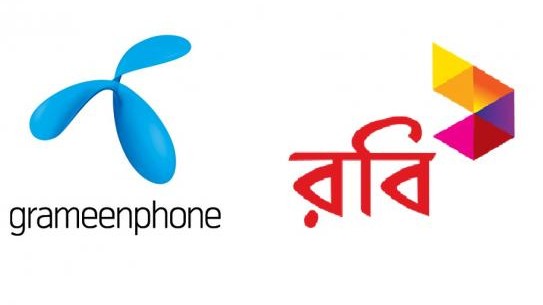Bandwidth of GP, Robi blocked partially for dues

The telecom regulator has partially blocked the bandwidth capacity of Grameenphone and Robi from last evening for non-payment of dues detected in audits -- a drastic step that ultimately hurts the 12.25 crore subscribers of the two operators.
According to the Bangladesh Telecommu-nication Regulatory Commission’s audit claim, Grameenphone has Tk 12,579.95 crore pending and Robi Tk 867.24 crore.
The telecom regulator had issued demand notes to the respective operators several times but they fell on deaf ears.
Subsequently, it directed all the international internet gateway operators to slash Grameenphone’s bandwidth by 30 percent and Robi’s by 15 percent -- substantial enough to slow down the internet speed and raise the call drop frequency of the two operators.
“We are deeply disturbed by this draconian step from a regulator,” said Shahed Alam, chief of corporate and regulatory affairs at Robi.
The operator has already raised its concerns regarding the fundamentally flawed audit claims through official correspondence with the BTRC, he said in a statement.
Until yesterday, Robi was consuming about 150.67 gigabits per second bandwidth. It was brought down to 128 Gbps. Grameenphone was using 209.93 Gbps bandwidth and after the decision it came down to 146.95 Gbps.
The decision to forcefully reduce bandwidth runs counter to supporting customer interests, said Md Hasan, a deputy general manager of Grameenphone.
“This instruction seems to be designed to penalise our gateway partners and could have a negative impact on millions of data users in Bangladesh. We are surprised by the instruction and question the legality of this action,” he added.
Other than mobile operators, independent experts also vehemently criticised the move.
“This is an unlawful decision,” said Abu Saeed Khan, senior policy fellow at LIRNEasia, an information and communication technology policy and regulation think-tank active in the Asia Pacific region.
The government does not have the authority to curtail the legally purchased internet bandwidth as a punitive measure for unpaid dues, he added.
However, Md Jahurul Haque, chairman of the telecom watchdog, told The Daily Star, “We have no other way of blocking their capacity to realise the public money.”
Earlier, the regulator has suspended issuing the no-objection certificate (NOC) to the two operators from even importing equipment to run the network.
“Customers may face little challenges but that will not be unbearable and when the operators pay the dues we will immediately withdraw the restriction.”
The decision was made after discussions with high officials of the government, Haque added.
Both the operators said they had invited the BTRC to settle the dispute through arbitration a number of times, a lawful process to solve such matters.
“Rather than choosing the path of arbitration, the BTRC has decided to take a step that hurts the interests of customers the most. However, we are confident that we can ensure satisfactory level of quality of our service even with the limited bandwidth,” Alam added. The BTRC chairman declined to enter into arbitration as there is no provision under the telecom act.
